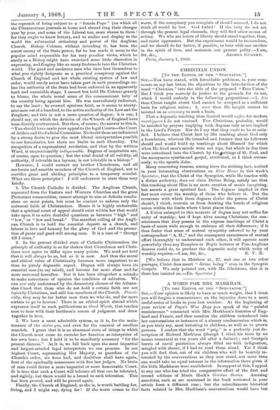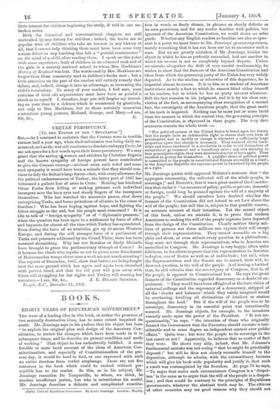A WORD FOR MRS. MARKHAM.
[To THE EDITOR OF THE " SPECTATOR."] Sin,—Your opinion is likely to have so much weight, that I trust you will forgive a remonstrance on the injustice done to a most useful series of books in your last number. At the beginning of your review of Papa's Wise Dogs you speak of the "painful reminiscence" connected with Mrs. Markham's histories of Eng- land and France, and then mention the children introduced into her conversations as instances of a clumsy condescension which is, as you truly say, most irritating to children, as well as to grown persons. I confess that the word "prig" is a perfectly just de- scription of Richard Markham (though I think his tears by no means unnatural at ten years old after a failure) ; and George's bursts of naval patriotism always filled me with indignation, mingled with shame, if I had to read them aloud. Yet I think you will find that, out of six children who will be heartily in- terested by the conversations as they now stand, not more than one would take an equal interest in the information there given if the little Markhams were annihilated. In support of this, I appeal to any one who has tried the comparative effect of the first and second editions of Maria Hack's Grecian Stories. Amusing anecdotes, such as are contained in the book reviewed in your article form a different case ; but the miscellaneous historical facts related in Mrs. Markham's conversations would have but
little interest for children beginning the study, if told in one un- broken series.
Both the historical and conversational chapters are still unrivalled by any history for children ; indeed, the books are so popular with all children who take an interest in any history at all, that I cannot help thinking there must have been some very serious defect in any teaching that left a "painful reminiscence" on the mind of a child after reading them. I speak on this point with some experience, both of children in an educated rank and of the girls in a country national school, to whom Mrs. Markham's _History of England was lent. The words used by Mrs. Markham are longer than those commonly used in children's books now ; but a little attention on the part of the teacher will entirely remedy that defect, and, indeed, change it into an advantage, as increasing the child's vocabulary. To many of your readers, I feel sure, your criticism of their old acquaintance must have been as painful a shock as to myself. I, therefore, hope you will forgive my intrud- ing on your time by a defence which is occasioned by gratitude, not only to Mrs. Markham, but to those certainly somewhat sententious young persons, Richard, George, and Mary.-1 am,









































 Previous page
Previous page